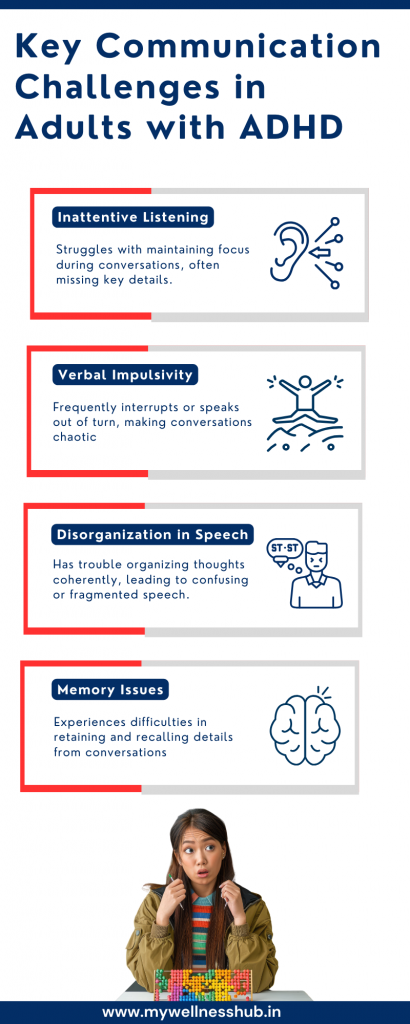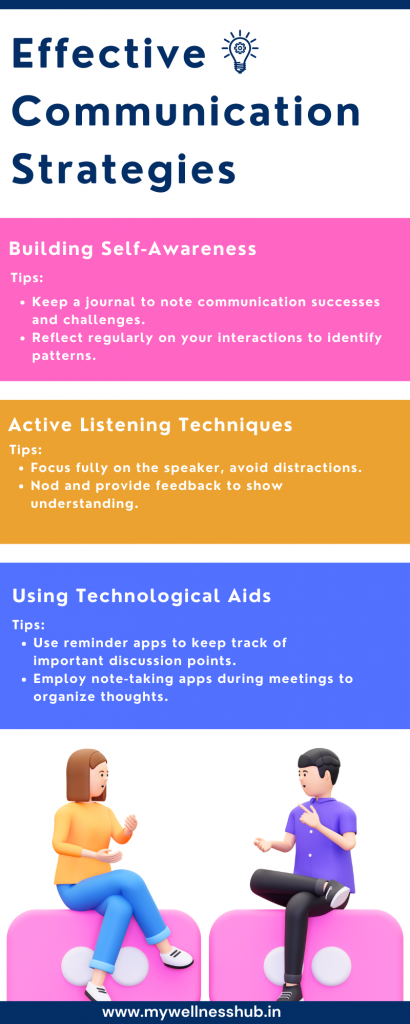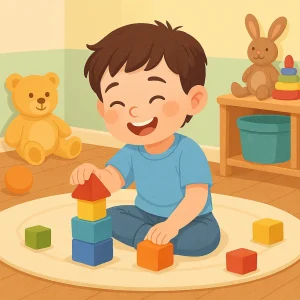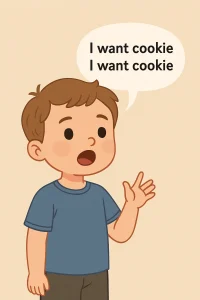Understanding Communication Barriers In Adults With ADHD
By Rajini D
Last Updated: May 10, 2024
Attention Deficit Hyperactivity Disorder (ADHD) is more than just a challenge of focusing or staying still. For many, it’s a lifelong journey that starts in childhood and extends into adulthood. Despite popular belief, ADHD isn’t just a childhood disorder; it continues to affect millions of adults around the world. In fact, research suggests that approximately 4% of adults globally struggle with ADHD, many of whom face daily hurdles that go unnoticed by the untrained eye.
One of the less discussed but significantly impactful aspects of adult ADHD is communication. Adults with ADHD often encounter unique barriers in how they interact with others, which can lead to misunderstandings and strained relationships both personally and professionally. This article explores these communication barriers, shedding light on the challenges and offering insight into overcoming them. Here, we’re not just talking about the struggles; we’re focusing on empowering adults with ADHD to navigate their social worlds more effectively.
Understanding ADHD and Its Impact on Communication
When we talk about ADHD, the conversation often gravitates toward its hallmark symptoms: inattention, hyperactivity, and impulsivity. But how do these symptoms play out in everyday communication for adults diagnosed with the disorder? The impact can be profound and pervasive, affecting not just how individuals speak but how they listen, respond, and engage in conversations.
Read more: Speech Therapy: Improve Communication in Adults
How ADHD Symptoms Affect Communication
Inattention in adults with ADHD isn’t just about difficulty paying attention to tasks; it’s also about struggling to stay focused during conversations. This might mean missing key details or the overarching context of what’s being said. Imagine trying to follow a plot in a movie while the scenes keep changing abruptly. That’s a day in the life of someone managing ADHD inattentiveness in conversations.
Hyperactivity manifests differently in adults compared to children. It might not mean running around, but it could involve internal restlessness that makes it hard to stay present in conversations. Adults with ADHD often feel like their minds are buzzing with thoughts, which can make them seem like they’re not listening or are disinterested—even when they care deeply about the interaction.
Impulsivity in communication leads to interrupting or blurting out responses without fully processing the information or considering its impact. It’s not about a lack of manners but rather a challenge in controlling one’s immediate reactions.
The Dual Challenge: ADHD Symptoms and Communication
Managing ADHD symptoms while trying to engage effectively in communication is like juggling while balancing on a moving ball. It requires immense focus and can be incredibly draining. For adults with ADHD, it is not only about dealing with their internal experiences during interactions but also managing how these interactions are perceived by others. Misunderstandings can escalate quickly when symptoms interfere with the intent and content of communication.
Also read: ADHD and Autism: Similarities and Differences
Key Communication Challenges for Adults with ADHD

Adults with ADHD often face several distinct communication challenges that can complicate everyday interactions. Understanding these challenges is the first step toward managing them effectively. Here, we break down the key areas where ADHD typically affects communication:
Inattentive Listening
For many adults with ADHD, maintaining focus during conversations can be a significant struggle. This issue, known as inattentive listening, isn’t about a lack of interest or care. Instead, it’s about the difficulty in sustaining attention, which can cause important details to slip through the cracks. Imagine trying to listen to a friend while a TV plays in the background; for someone with ADHD, distractions like these can feel magnified, making it hard to stay engaged in the conversation.
Verbal Impulsivity
Verbal impulsivity is another common hurdle. Many adults with ADHD find it challenging to control their urge to speak out of turn. This impulsiveness isn’t just about being eager to contribute but also involves difficulty regulating one’s speech timing. This can lead to interrupting others or blurting out thoughts without fully forming them, which can sometimes result in misunderstandings or frustration in social and professional settings.
Disorganization in Speech
When it comes to expressing thoughts, disorganization in speech is a frequent issue for those with ADHD. This disorganization isn’t merely about stumbling over words; it’s about struggling to organize thoughts coherently before speaking. For listeners, this can make the conversation hard to follow, as the speaker may jump from one topic to another without clear transitions or conclusions.
Memory Issues
Finally, memory issues often play a significant role in communication for adults with ADHD. These aren’t just about forgetting a name or a date; they involve challenges in retaining and recalling details from conversations. Working memory deficits mean that even if someone with ADHD manages to focus during a discussion, they might not remember key points later on. This can lead to repetitive conversations or the perception that they aren’t paying attention.
Also Read: ADHD & Stuttering: Connected Challenges, Empowering Solutions
Practical Strategies to Overcome Communication Barriers
While ADHD can present significant communication challenges, there are effective strategies that can help manage these difficulties. Let’s explore some practical approaches that adults with ADHD can adopt to improve their communication skills, ensuring more fulfilling interactions both personally and professionally.

Building Self-Awareness
The first step towards improving communication for adults with ADHD is to develop a keen awareness of one’s own communication patterns. This involves reflecting on how ADHD symptoms manifest in conversations and recognizing the triggers that exacerbate these issues. By understanding your typical response patterns, you can begin to notice when you might be interrupting, not listening fully, or losing track of the conversation.
Action Tip: Keep a journal of communication exchanges that felt challenging and note what went wrong. Reflect on these entries to identify patterns and plan how you might handle similar situations differently in the future.
Active Listening Techniques
Active listening is a critical skill for improving communication for individuals with ADHD. It involves fully concentrating, understanding, responding, and then remembering what is being said. Here are some tips to enhance active listening:
- Focus on the speaker: Look at the speaker directly and put aside distracting thoughts to give them your full attention.
- Show that you are listening: Nod occasionally, smile at the speaker, and make sure your posture is open and inviting.
- Provide feedback: Reflect on what has been said by paraphrasing. “What I’m hearing is” and “Sounds like you are saying” are great ways to reflect back.
- Defer judgment: Allow the speaker to finish each point before asking questions.
Speech and Language Therapy
For those struggling significantly with communication, professional help from a speech-language pathologist can be invaluable. These specialists can help adults with ADHD develop better speech patterns, improve their ability to listen actively and organize their thoughts more effectively during conversations.
Action Tip: Consider scheduling a consultation with a speech therapist who has experience with adult ADHD. Even a few sessions can provide useful strategies and tools.
Integrating These Strategies
Integrating these strategies into daily life doesn’t have to be overwhelming. Start small, choose one area to focus on, and gradually incorporate more techniques as you become more comfortable. Remember, the goal is not perfection but progress. Every step you take to improve your communication can significantly impact your relationships and daily interactions.
Creating a Supportive Environment
For individuals with ADHD, a supportive and understanding environment can make a significant difference in managing communication barriers. Whether at home, in the workplace, or among friends, the right approach can foster smoother interactions and strengthen relationships. Here are some practical tips for friends, family, and coworkers on how to effectively communicate with someone who has ADHD, ensuring patience and understanding are at the forefront.
Tips for Friends and Family
- Stay patient: Understand that communication might take more time and effort. Allow the person with ADHD to express themselves without rushing them or finishing their sentences.
- Use clear and concise communication: Keep instructions and information straightforward and direct. Avoid overloading with too many details at once.
- Be an active listener: Show that you are engaged and interested by nodding, maintaining eye contact, and avoiding interruptions while they are speaking.
- Offer reminders and support: Since memory can be a challenge, gentle reminders about upcoming events or discussions can be helpful. Doing this respectfully and kindly is key.
- Encourage open dialogue: Create an environment where the person with ADHD feels comfortable discussing their needs and strategies that might help in improving communication.
Tips for Coworkers
- Foster an inclusive workspace: Encourage a culture where diversity, including neurodiversity, is respected and supported. This starts with awareness and education about ADHD and its impacts.
- Adapt communication methods: Utilize written forms of communication when possible, such as emails or memos, which can be easier for someone with ADHD to process and refer back to.
- Schedule regular check-ins: These can provide opportunities for clear, focused discussions on work expectations and feedback, which can be beneficial for both parties.
- Prioritize organization: Help create structured systems or suggest organizational tools that can alleviate common ADHD-related challenges in the workplace.
Comparison of Traditional vs. ADHD-Friendly Communication Techniques
| Technique | Traditional Approach | ADHD-Friendly Approach |
|---|---|---|
| Listening | Expecting continuous attention; no aids used. | Allowing breaks; using visual aids or written summaries. |
| Speaking | Long, uninterrupted monologues without checks. | Short, structured exchanges with frequent checks for understanding. |
| Organizing Thoughts | Expectation to organize thoughts rapidly and coherently. | Using outlines or visual organizers before speaking. |
| Following Up | Assumes retention of information and compliance. | Using reminders via apps or calendars; follow-up emails or messages. |
Wellness Hub’s Role in Supporting Individuals with ADHD
At Wellness Hub, we understand that living with ADHD presents unique challenges, especially when it comes to communication. That’s why we’re dedicated to providing resources and support that cater specifically to the needs of individuals with ADHD, helping them to manage symptoms and enhance their communication skills effectively.
Providing Tailored Resources
We offer a variety of resources that are specifically designed to support the ADHD community. From informative articles and interactive webinars to personalized coaching and therapy sessions, our aim is to provide tools that help individuals understand and navigate the complexities of ADHD. Each resource is crafted to aid in breaking down communication barriers, building self-awareness, and fostering better interpersonal interactions.
Enhancing Communication Skills
Communication is a critical area where many individuals with ADHD seek improvement. To address this, Wellness Hub offers specialized programs that focus on developing effective communication strategies. These programs include training in active listening, speech organization, and managing verbal impulsivity, which are all common challenges faced by adults with ADHD.
Encouraging Exploration of Services
We invite our readers to explore the range of services available at Wellness Hub. Whether you are dealing with ADHD yourself or know someone who is, our comprehensive suite of services is designed to assist in various aspects of managing ADHD. From initial assessments to ongoing support, our team is here to guide you every step of the way.
While our focus is on providing support, we encourage you to explore these options at your own pace. Our goal is not just to promote our services but to ensure that you find genuine help and guidance through our offerings.
Conclusion
Understanding and tackling communication challenges is crucial for improving life quality, especially for adults with ADHD. Effective communication techniques such as enhancing self-awareness and practicing active listening can greatly help. These strategies enable clearer expression and stronger connections with others, reducing misunderstandings and boosting confidence.
Support from family, friends, and colleagues is also essential. Their patience and understanding can create a supportive environment that fosters positive interactions and personal growth. At Wellness Hub, we are dedicated to offering resources and guidance to help manage ADHD effectively. We invite you to explore our services and learn how we can support your journey towards better communication and enriched relationships.
Frequently Asked Questions:
1. What are common communication challenges faced by adults with ADHD?
Adults with ADHD often struggle with inattentive listening, verbal impulsivity, disorganized speech, and memory issues. These challenges can make it difficult to maintain focus in conversations, organize thoughts coherently, and remember important details.
2. How can speech therapy help adults with ADHD improve communication?
Speech therapy can be very beneficial for adults with ADHD. It helps improve articulation, organize thoughts during conversation, enhance listening skills, and develop strategies to manage verbal impulsivity.
3. What are some effective communication strategies for someone with ADHD?
Effective strategies include practicing active listening, using reminders and note-taking apps to keep track of important information, and employing mindfulness techniques to stay focused during conversations.
4. How can friends and family support someone with ADHD in communication?
Friends and family can help by being patient, providing clear and concise information, using written communication when possible, and offering gentle reminders to help with memory issues.
5. What role does self-awareness play in managing communication barriers for adults with ADHD?
Self-awareness helps individuals recognize their communication patterns and understand how their ADHD symptoms affect their interactions. This awareness is crucial for identifying strategies that can help manage these challenges effectively.
6. Can technology aid in improving communication for adults with ADHD?
Yes, technology can be a great aid. Tools like smartphone apps for reminders, note-taking, and organizing daily tasks can help manage communication more effectively.
7. What impact do communication barriers have on the personal and professional lives of adults with ADHD?
Communication barriers can lead to misunderstandings and conflicts in personal relationships and may cause challenges in professional settings, such as in job performance or maintaining professional relationships.
8. Why is it important to address communication barriers in adults with ADHD?
Addressing these barriers is crucial for improving interpersonal relationships, professional success, and overall quality of life. Effective communication strategies can lead to better understanding, reduced conflict, and more supportive interactions.
9. What techniques can adults with ADHD use to improve active listening?
Adults with ADHD can enhance their active listening skills by minimizing distractions during conversations, focusing fully on the speaker, and using reflective techniques such as summarizing what’s been said and asking clarifying questions to ensure understanding.
10. Are there specific tools or apps recommended for adults with ADHD to help manage communication challenges?
Yes, several tools and apps are designed to assist with communication challenges. For example, digital planners like Google Calendar can help manage schedules, while apps like Evernote or Microsoft OneNote are excellent for note-taking. Additionally, mindfulness apps such as Headspace or Calm can help improve focus and reduce impulsivity during conversations.
About the Author:
Rajini Darugupally
M.Sc., Speech-Language Pathologist (9+ years of experience)
Rajini is a passionate and dedicated Speech-Language Pathologist with over 9+ years of experience, specializing in both developmental speech and language disorders in children and rehabilitation in adults. Driven by a desire to empower each individual to find their voice, Rajini brings a wealth of experience and a warm, genuine approach to therapy.
Currently, at Wellness Hub, she thrives in a team environment that values innovation, compassion, and achieving results for their clients.
Connect with Rajini to learn more about how she can help you or your loved one find their voice.
Book your Free Consultation Today
Parent/Caregiver Info:
Client’s Details:
* Error Message








